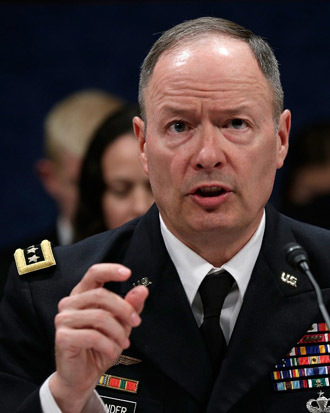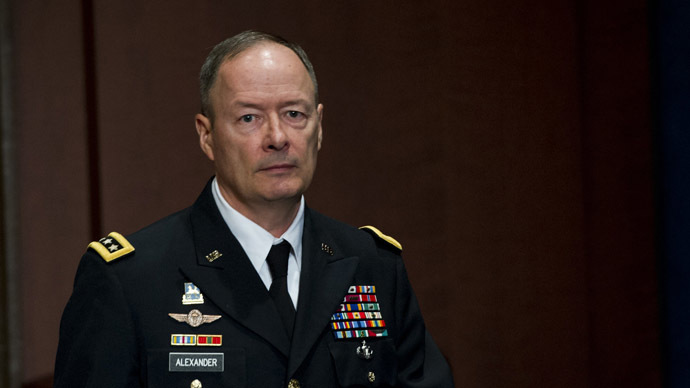The head of the National Security Agency said Tuesday that more than 50 potential terrorist plots across the globe were thwarted thanks to the controversial surveillance programs recently exposed by former contractor Edward Snowden.
NSA chief Gen. Keith Alexander took center stage Tuesday when he answered questions on Capitol Hill alongside high-ranking members of the Federal Bureau of Investigation and the National Director of Intelligence’s office.
Late last week, Alexander promised to declassify and release this Monday a list of planned terror attacks prevented by the NSA’s surveillance programs. At Tuesday’s hearing, however, he said the list was still forthcoming and would be presented to members of Congress on Wednesday.
In the meantime, Alexander claimed that more than 50 terror plots were thwarted by the dragnet data gathering leaked by Snowden, with perhaps the deadliest attacks halted by the intelligence community involving ones aimed at the New York Stock Exchange and the New York City metro system.
Tuesday’s hearing, hosted by the Permanent Select Committee on
Intelligence, was the latest in a barrage of meetings held in
Washington since Snowden, a 29-year-old contractor at Booz Allen
Hamilton, leaked documents to The Guardian exposing programs
within the United States that allowed the government to collect
telephony and email data from American citizens.

The release of those documents, Alexander said Tuesday, sparked “considerable debate” in the week since Snowden went public, but that selective leaking led to only “incomplete and inaccurate information” being published.
Alexander vigorously denied that NSA spies on Americans, and instead insisted that his agency only specifically targets non US persons located abroad that are also reasonably believed to have ties with known terrorist groups. Answering direct question from House Intelligence Chairman Rep. Mike Rogers (R-Michigan) on whether or not NSA has the capability of wiretapping Americans with the "flip a switch," Alexander and his deputy said the agency has neither the authority nor the technological ability to do so.
Speaking to the more than 50 terror plots disrupted by the surveillance programs, Alexander said at least 10 of those foiled events involved homeland-based threats, and one of them included a plot that targeted Wall Street. The dozens of the cases will be brought to Congress later this week in the form of classified documents, but Deputy FBI Director Sean Joyce provided the committee with a glimpse at what the intelligence community has been able to do using surveillance programs put in place after 9/11.
According to Joyce, the NSA used its authority under Section 702 of the Foreign Intelligence Surveillance Act to intercept an email from a terrorist based in Pakistan attempting to contact a colleague in the US about explosives. Joyce added that the recipient of the email was determined to be Najibullah Zazi, and soon the FBI followed him from Denver, Colorado to New York City.
“Later we executed search warrants with the NY Joint Terrorism Task Force and NYPD and found bomb making components in backpacks. Zazi later confessed to a plot to bomb the NY subway system with backpacks,” Joyce said.
According to the FBI deputy, this foiled plot marked the first
attempt from core al-Qaeda to target the US since the 9/11
attacks. Joyce went on to further document situations where
allegedly critical terrorist plots were put on ice, including a
US citizen from Chicago’s attempt to bomb a Dutch newspaper and a
plot to blow up the NYSE.
"NSA utilizing 702 authority was monitoring a known extremist
in Yemen," Joyce declared in his written statement. "This
individual was in contact with an individual in the United States
named Khalid Ouazzani. Ouazzani and other individuals that we
identified through a FISA that the FBI applied for through the
FISC, were able to detect a nascent plotting to bomb the NYSE.
Ouazzani had been providing information and support to this plot.
The FBI disrupted and arrested these individuals."
Shortly after the FBI officer made those remarks, the attorney for Ouazzani responded with apparent disbelief.
“Khalid Ouazzan was not involved in any plot to bomb the New York Stock Exchange,” Robin Fowler, the defendant’s defense attorney, said in a telephone interview to Wired.
According to the plea agreement, obtained by the website, Ouazza and others "discussed how they could perform other tasks at the request of and for the benefit of al-Qaeda. Some of defendant’s conversations with others also involved plans for them to participate in various types of actions to support al-Qaeda, including fighting in Afghanistan, Iraq or Somalia. Defendant and the others he was communicating with about al-Qaeda took various steps and used various techniques to disguise their communications about their plans and assistance to support al-Qaeda."
The FBI has not yet responded to Fowler's counter, but the
intelligence officials who testified early Tuesday were
relentless with insisting that the mechanisms used today by the
likes of the NSA, FBI and DNI are instrinumental in combating
terror.
If the intelligence community had the same systems in place before September 2011, Alexander said the al-Qaeda launched attacks of 9/11 could have likely been prevented. Section 702 of FISA helped in 90 percent of the 50 attempted terrorist attacks that were disrupted, said Alexander.
After nearly three hours of questioning from members of the committee, Rep. Michele Bachmann (R-Minnesota) asked Alexander if the NSA operates any database to store the emails, telephone calls, text messages or GPS coordinates for Americans.
“No, we do not,” said Alexander.
The NSA’s chief’s claim contradicts that made by Edward Snowden last week. In an interview with The Guardian, the leaker said the NSA can "wiretap anyone, from you or your accountant to a federal judge to even the president." Referring to the leaked documents attributed to Snowden, Alexander said the release of the classified information caused, in his opinion, “irreversible and significant damage to the US” and helped America’s enemies.

